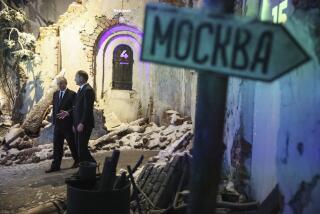The Post-Chernobyl World
- Share via
Silver linings are hard to find in the aftermath of a human and technological disaster such as the accident at the Chernobyl nuclear power plant in the Soviet Union. But one good thing has in fact come from the tragedy: increasing recognition of the need for international standards on reactor safety and for full and prompt notification of the international community when safeguards fail and a serious accident occurs.
It won’t be easy to win agreement on such an international code in the face of resistance not only from secrecy-obsessed Soviet political leaders but also from regulation-weary members of the nuclear industry in the West. But the effort must be made. And the fact that Chernobyl scared the daylights out of the Soviets and everybody else gives some reason for hope.
The stature of the Soviet government has been taken down several global notches because of its handling of the Chernobyl accident, and for good reason. When significant amounts of radioactivity are released into the atmosphere or into bodies of water that flow across national boundaries, other nations have a right to know very quickly what is going on so that they may do whatever is necessary to safeguard the health and safety of their own people. Other nations also have a right to know just how an accident happened, in order to determine whether their own reactor designs or operating procedures need correcting.
Moscow didn’t report the Chernobyl accident at all for nearly three days, by which time radioactive clouds had already spread over neighboring countries and begun entering into the food chain. Days later Soviet authorities were still more interested in withholding detailed information about the accident than in releasing it.
The result has been an international outcry--led not by the United States, but by West Germany, Japan and other nations that felt themselves threatened--buttressed by demands for some international rules covering such cases.
Nothing in international law formally obliged Moscow to do more than it did. The International Atomic Energy Agency has a set of rules for reporting nuclear accidents, but they are not mandatory.
That isn’t good enough. What’s needed is an international agreement that would formally subject everybody--Americans, Russians, Englishmen, Frenchmen or whoever--to a body of inspection and accident reporting requirements.
The Soviets, under diplomatic pressure, show signs of recognizing this reality. They invited officials of the IAEA to Moscow. And, while they may well play a different game later, Kremlin spokesmen have been hinting at acceptance of an international inspection system.
The Soviets cannot be singled out for attention; nuclear reactor safety is a global problem. The United States and other western countries, as well as Third World nations with nuclear reactors, must be willing to accept the same rules. We suspect that the idea of an international reactor safety system will, as a matter of fact, encounter resistance in the United States as elsewhere from an industry that feels it is overregulated already.
Even if an international agreement covering commercial reactors can be negotiated, it might prove hard to enforce. If in a future accident the Soviet Union or anybody else was determined to cover-up, they could. But they would have to do so in the clear knowledge that they were violating an international covenant and would be condemned.
It will be a long time before people everywhere stop dividing the history of nuclear power into two periods--pre-Chernobyl and post-Chernobyl. That allows some hope that the nations of the world will close ranks against a threat that recognizes no borders or ideological distinctions.
More to Read
Sign up for Essential California
The most important California stories and recommendations in your inbox every morning.
You may occasionally receive promotional content from the Los Angeles Times.













